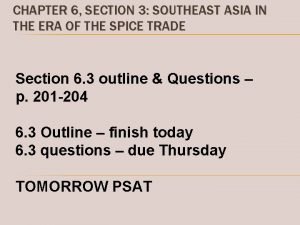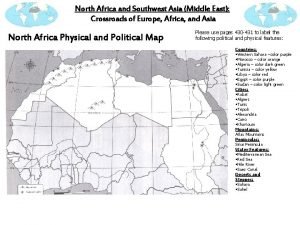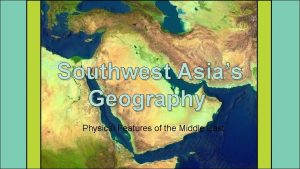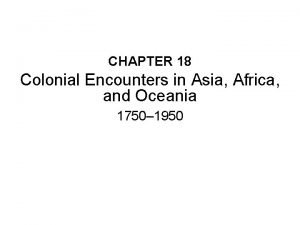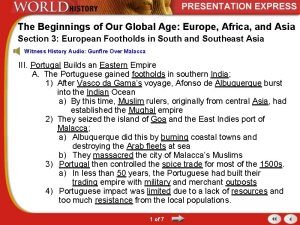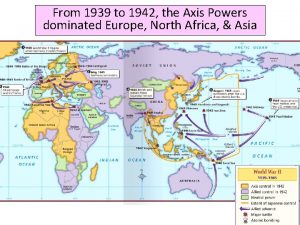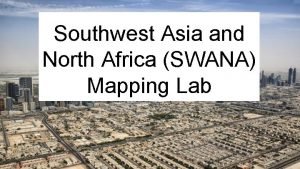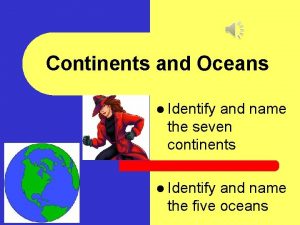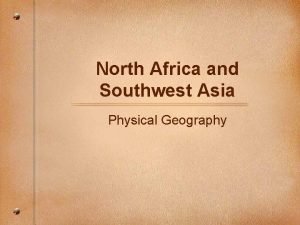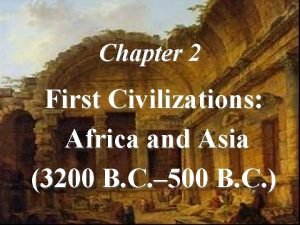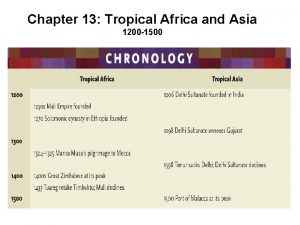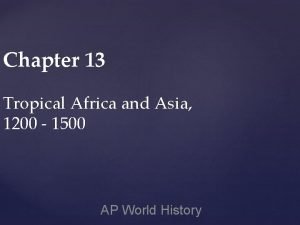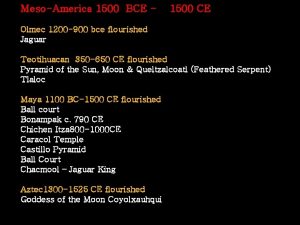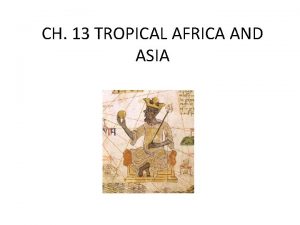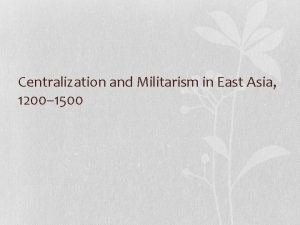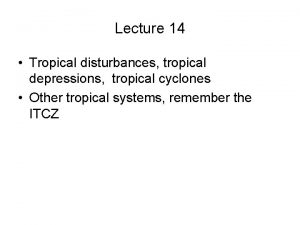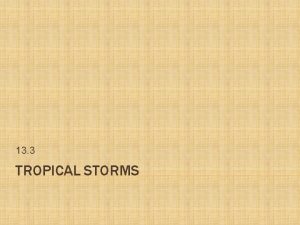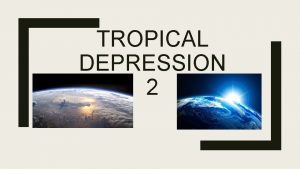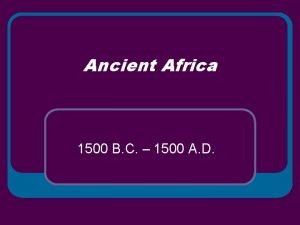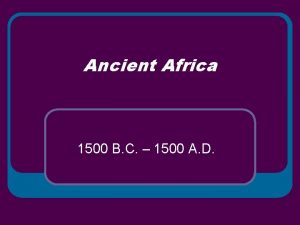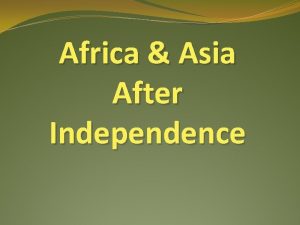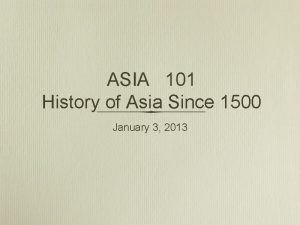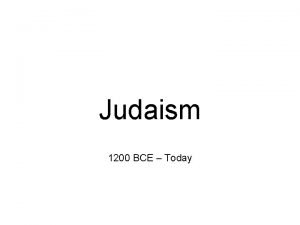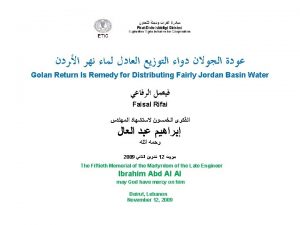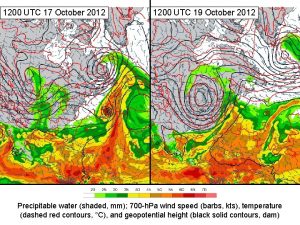I Tropical Africa Asia 1200 1500 Africa The



























- Slides: 27

I. Tropical Africa & Asia (1200 -1500)

Africa: The “Tropical” Continent Tropic of Cancer 20° N Equator 0° Tropic of Capricorn 20° S

Vegetation Zones

A. Tropical Environment 1. equator marks center of the tropical zone: Africa, India, S. E. Asia 2. cycle of rainy & dry seasons in tropics --dry air in E. Africa/Arabia --moist air in W. Africa & S. E. Asia (monsoons) 3. Central Africa: grasslands & jungle (Congo)

B. Ibn Battuta 1. Ibn Battuta (13041369): Muslim scholar from Morocco who explored the Islamic world 2. Battuta’s journal provides thorough historical data

Ibn Battuta’s Travels -- Ibn Battuta covered more than 73, 000 miles (twice as many as Marco Polo)

C. African Kingdoms 1. Ghana 750 -1076 2. Mali 1235 -1610 3. Songhay 1464 -1612 4. Great Zimbabwe 11 th-15 th C. E. 5. Swahili coast 12 th-15 th C. E.


D. Mali Empire (1235 -1610) 1. The state founded by Sundiata 2. wealth from the Trans-Saharan trade route 3. Mali: contained 3 immense gold mines & empire taxed every ounce of gold or salt 4. profound cultural diffusion along the Niger River

5. Mansa Musa --greatest king of Mali: Mansa Musa (1312 -1337) --developed the gold & salt trade --Mansa Musa was a Muslim & built mosques across w. Africa --1324 he made the hajj to Mecca & brought 60, 000 servants with 4, 000 lbs. of gold

Mosque in Mali

Ancient Timbuktu

I. Delhi Sultanate (1206 -1526)

A. Muslim Rule in India 1. Fall of the Gupta Empire: in the 500’s India broke apart into small kingdoms 2. The Arrival of Islam --Arab Muslim traders arrived in India --traders sailed to ports on west coast in search of spices (Indian Ocean Trade) --traders settled in India; lived peacefully beside Hindus, Buddhists 3. Muslim Raiders: --early 700’s, Muslim raiders conquered Sind (Pakistan) --by 1200’s, most of northern India under Muslim control --Mongols (Mughals) invade NW India

Scandanavian Kingdoms Russia England H. R. E. France Spain Poland Mongol Empire Hungary Portugal Rum Almohad Caliphate Ayyubid Caliphate Mali Oyo Ethiopia Koryo Delhi Sultanate Sung China Kamakura Japan Angkor Benin Zimbabwe States & Empires in 1237 CE

B. Delhi Sultanate --once Muslims took control of north India, established new government for region based in city of Delhi --government became known as Delhi Sultanate --rulers in sultanate tolerant, allowed traditional customs, religions C. Blending of Cultures --rulers also worked to spread Muslim culture through India --invited artists, scholars from other parts of Islamic world --new culture formed, blending Muslim & Indian elements Ex: new language, Urdu, formed from Arabic & Sanskrit


D. Decline -- the Delhi Sultanate remained strong for about 300 years -- introduced extensive new water-control systems -- Timur invades Delhi in 1398 & by early 1500’s the Mughal Empire takes power

Change & Continuity over Time Essay (CCOT) 1. Acceptable thesis 2. Address ALL parts of the question 3. Region, Theme, Dates 4. Changes AND Continuity 5. MUST take a position on type of change

I. Prewrite Change topic -3 Facts -Analysis phrase Continuity topic -3 Facts -Analysis phrase Global Context topic -3 Facts -Analysis phrase

II. Essay format - CCOT 1. Thesis Paragraph (must show change & continuity) 2. Body Paragraph #1 – Change Topic Sentence – 3 Facts – Analysis: This changed occurred because …. 3. Body Paragraph #2 – Continuity Topic Sentence – 3 Facts – Analysis: Due to the ………… 4. Body Paragraph #3 – Global context topic sentence – Analysis of changes and continuities to other regions 5. Conclusion

Analyze the prompt! 1. Note the topic 2. Note the time period 3. Something changed and something stayed the same!


Thesis Writing Exercise Discuss the changes & continuities of how Islam spread in India from the 6 th century to the 16 th-century?



Thesis?
 In 1500 mainland southeast asia was a relatively
In 1500 mainland southeast asia was a relatively America africa and europe before 1500
America africa and europe before 1500 Colonial encounters in asia africa and oceania
Colonial encounters in asia africa and oceania Kums definition geography
Kums definition geography Southwest asia/north africa (swana) political map
Southwest asia/north africa (swana) political map Inlet of indian ocean between africa and asia
Inlet of indian ocean between africa and asia Physical features in the middle east
Physical features in the middle east Chapter 18 colonial encounters in asia and africa
Chapter 18 colonial encounters in asia and africa European footholds in the eastern hemisphere
European footholds in the eastern hemisphere Who dominated europe, north africa and asia from 1939-1942?
Who dominated europe, north africa and asia from 1939-1942? Your name
Your name Swana political map
Swana political map Southwest asia and north africa physical map
Southwest asia and north africa physical map Country uniting africa and sw asia
Country uniting africa and sw asia List of continents and oceans
List of continents and oceans European imperialism webquest
European imperialism webquest South west asia and north africa map
South west asia and north africa map North africa and southwest asia mountains
North africa and southwest asia mountains Is egypt in africa or asia
Is egypt in africa or asia 101012 bằng
101012 bằng Công thức tiính động năng
Công thức tiính động năng Tỉ lệ cơ thể trẻ em
Tỉ lệ cơ thể trẻ em Lời thề hippocrates
Lời thề hippocrates đại từ thay thế
đại từ thay thế Vẽ hình chiếu đứng bằng cạnh của vật thể
Vẽ hình chiếu đứng bằng cạnh của vật thể Quá trình desamine hóa có thể tạo ra
Quá trình desamine hóa có thể tạo ra Môn thể thao bắt đầu bằng chữ đua
Môn thể thao bắt đầu bằng chữ đua Hát kết hợp bộ gõ cơ thể
Hát kết hợp bộ gõ cơ thể
